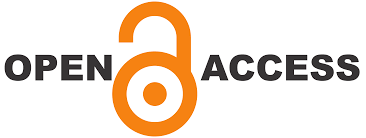STEM Digital Collaboration to Enhance Critical Thinking Skills of Secondary School Students: A Literature Review
DOI:
https://doi.org/10.66031/jinea.112025.8Keywords:
STEM Education, Digital Collaboration, Critical Thinking, Secondary School Students, Technology IntegrationAbstract
This literature review explores the role of STEM digital collaboration in enhancing critical thinking skills among secondary school students. As global demands for higher-order cognitive abilities intensify, integrating digital tools within STEM education has emerged as a promising approach to foster interactive, collaborative, and contextually meaningful learning experiences. The review synthesizes recent empirical studies and theoretical perspectives, highlighting innovative pedagogical models such as STEM-Blended Learning, Project-Based Learning, and STEM-based digital modules that effectively cultivate critical thinking. Notably, this study advances the understanding of how balanced technology integration, coupled with collaborative STEM activities, optimizes cognitive skill development while mitigating risks of overdependence on digital resources. The novelty of this review lies in its comprehensive focus on digital collaboration as a catalyst for critical thinking enhancement, bridging theoretical frameworks and practical applications in diverse secondary education contexts. Implications for educators and policymakers emphasize the strategic adoption of integrated STEM-digital pedagogies to prepare students for complex 21st-century challenges. Future research directions include evaluating cross-cultural effectiveness and addressing implementation barriers in technology-supported STEM collaboration.
Downloads
References
Abdulah, A., Mustadi, A., & Fitriani, W. (2021). PBL-Based Interactive Multimedia in Improving Critical Thinking Skills. JPI (Jurnal Pendidikan Indonesia), 10(1). https://doi.org/10.23887/jpi-undiksha.v10i1.25521
Alim, J. A., Hermita, N., Alim, M. L., Wijaya, T. T., & Pereira, J. (2021). Developing a Math Textbook using realistic Mathematics Education Approach to increase elementary students’ learning motivation. Jurnal Prima Edukasia, 9(2). https://doi.org/10.21831/jpe.v9i2.39393
Alsaleh, N. J. (2020). Teaching Critical Thinking Skills: Literature Review. The Turkish Online Journal of Educational Technology, 19(1).
Bertrand, M. G., & Namukasa, I. K. (2023). A pedagogical model for STEAM education. Journal of Research in Innovative Teaching and Learning, 16(2). https://doi.org/10.1108/JRIT-12-2021-0081
Fatqurhohman, F. (2025). Transformasi Kepemimpinan Pendidikan Era VUCA: Strategi Menuju Institusi Unggul dan Adaptif. CV. Ihsan Cahaya Pustaka. ihsancahayapustaka.id
Fatqurhohman, F., Sa’dijah, C., Sudirman, & Sulandra, I. M. (2020). Pictorial of representation in solving word problems. International Journal of Scientific and Technology Research, 9(3), 1057–1060.
Frenanto, A., Fatqurhohman, F., & Rhomdani, R. W. (2023). Identification of HOTS Problem Solving Ability of High School Students Using Two Tier Diagnostic. Journal of Education and Learning Mathematics Research (JELMaR), 4(2), 120–126. https://doi.org/10.37303/jelmar.v4i2.115
Fuchs, L. S., Gilbert, J. K., Fuchs, D., Seethaler, P. M., & Brittany, B. L. (2018). Text Comprehension and Oral Language as Predictors of Word-Problem Solving: Insights into Word-Problem Solving as a Form of Text Comprehension. Scientific Studies of Reading, 22(2), 152–166. https://doi.org/10.1080/10888438.2017.1398259
Gaskins-Scott, T. (2020). Successful Global Collaborations in Higher Education Institutions. Journal of Interdisciplinary Studies in Education, 9(1). https://doi.org/10.32674/jise.v9i1.1709
Hamdan, A. H., & Saripudin, M. (2023). Designs for research, teaching, and learning: A framework for future education. Innovations in Education and Teaching International, 60(5). https://doi.org/10.1080/14703297.2023.2241319
Hamengkubuwono, Asha, L., Warsah, I., Morganna, R., & Adhrianti, L. (2022). The Effect of Teacher Collaboration as the Embodiment of Teacher Leadership on Educational Management Students’ Critical Thinking Skills. European Journal of Educational Research, 11(3). https://doi.org/10.12973/eu-jer.11.3.1315
Hanatan, R. B., Yuniastuti, E., & Prayitno, B. A. (2023). Developing Interactive Digital Modules on Discovery Learning to Improve Students Learning Interest. Jurnal Teknodik. https://doi.org/10.32550/teknodik.vi.862
Haryadi, R., Situmorang, R., & Khaerudin, K. (2021). Enhancing Students’ High-Order Thinking Skills through STEM-Blended Learning on Kepler’s Law During Covid-19 Outbreak. Jurnal Penelitian Dan Pembelajaran IPA, 7(2). https://doi.org/10.30870/jppi.v7i2.12029
Haryanto, H., Samsudi, S., & Arbarini, M. (2024). Development of project-based learning model based on ethno-steam to improve numeracy literacy skills. Inovasi Kurikulum, 21(1). https://doi.org/10.17509/jik.v21i1.63400
Hasanah, Z., Ritonga, S., Ikhsan, Z., & Suarni, S. (2021). The Implementation of Problem Based Learning Integrated with STEM-Based Worksheets to Improve Learning Motivation. Asian Journal of Science Education, 3(2). https://doi.org/10.24815/ajse.v3i2.19745
Hsu, Y. C. (2021). An action research in critical thinking concept designed curriculum based on collaborative learning for engineering ethics course. Sustainability (Switzerland), 13(5). https://doi.org/10.3390/su13052621
Huang, C.-W. (2022). Book Review: Multimodal Literacies Across Digital Learning Contexts. Multimodality & Society, 2(4). https://doi.org/10.1177/26349795221126802
Hunaidah, H., Susantini, E., Wasis, W., Prahani, B. K., & Mahdiannur, M. A. (2018). Improving Collaborative Critical Thinking Skills of Physics Education Students through Implementation of CinQASE Learning Model. Journal of Physics: Conference Series, 1108(1). https://doi.org/10.1088/1742-6596/1108/1/012101
Jia, L., Jalaludin, N. A., & Rasul, M. S. (2023). Design Thinking and Project-Based Learning (DT-PBL): A Review of the Literature. International Journal of Learning, Teaching and Educational Research, 22(8). https://doi.org/10.26803/ijlter.22.8.20
Kim, J., Lee, H., & Cho, Y. H. (2022). Learning design to support student-AI collaboration: perspectives of leading teachers for AI in education. Education and Information Technologies, 27(5). https://doi.org/10.1007/s10639-021-10831-6
Kusumawati, R., Hobri, & Hadi, A. F. (2019). Implementation of integrated inquiry collaborative learning based on the lesson study for learning community to improve students’ creative thinking skill. Journal of Physics: Conference Series, 1211(1). https://doi.org/10.1088/1742-6596/1211/1/012097
Liao, C. H., & Wu, J. Y. (2022). Deploying multimodal learning analysis models to explore the impact of digital distraction and peer learning on student performance. Computers and Education, 190. https://doi.org/10.1016/j.compedu.2022.104599
Liston, M., Morrin, A. M., Furlong, T., & Griffin, L. (2022). Integrating Data Science and the Internet of Things Into Science, Technology, Engineering, Arts, and Mathematics Education Through the Use of New and Emerging Technologies. Frontiers in Education, 7. https://doi.org/10.3389/feduc.2022.757866
Mao, W., Cui, Y., Chiu, M. M., & Lei, H. (2022). Effects of Game-Based Learning on Students’ Critical Thinking: A Meta-Analysis. Journal of Educational Computing Research, 59(8). https://doi.org/10.1177/07356331211007098
Mayasari, A., Arifudin, O., & Juliawati, E. (2022). Implementasi Model Problem Based Learning ( PBL ). Jurnal Tahsinia, 3(2).
Muhammad, I., Mukhibin, A., Naser, A. D. muhamad, & Dasari, D. (2022). Bibliometric Analysis: Research Trend of Interactive Learning Media in Mathematics Learning in Indonesia. Prisma Sains : Jurnal Pengkajian Ilmu Dan Pembelajaran Matematika Dan IPA IKIP Mataram, 11(1). https://doi.org/10.33394/j-ps.v11i1.6595
Nasir, M., Cari, C., Sunarno, W., & Rahmawati, F. (2022). The effect of STEM-based guided inquiry on light concept understanding and scientific explanation. Eurasia Journal of Mathematics, Science and Technology Education, 18(11). https://doi.org/10.29333/ejmste/12499
Noto, M. S., Amiruddin, M. H., Maemunah, S., Bakar, M. T., & Sumarni, P. (2023). Students’ Mathematical Logical Thinking in Terms of Learning Style. Rangkiang Mathematics Journal, 2(1). https://doi.org/10.24036/rmj.v2i1.24
Nurazmi, & Bancong, H. (2021). Integrated STEM-Problem Based learning Model: Its Effect on Students’ Critical Thinking. Kasuari: Physics Education Journal, 4.
Permatasari, L. O. E., Fatqurhohman, F., & Imamah, N. (2025). Analisis Kemampuan Representasi Mamatematis Siswa SMP dalam Pemecahan Masalah Bangun Ruang. Jurnal Equation, 8(1), 118–128.
Pratama, A. D., Fatqurhohman, F., & Hasanah, F. D. A. (2025). Meningkatkan Komunikasi Matematis Dengan PBL Berbantuan Matcha Math Card Pada Materi Fungsi Kuadrat Siswa X SMA. SCIENCE: Jurnal Inovasi Pendidikan Matematika Dan IPA, 5(2), 546–560. https://doi.org/10.51878/science.v5i2.5094
Rahayu, I. M. P., Nasution, N., & Mustaji, M. (2023). Development of Digital Student Worksheets with the Discovery Learning Model to Improve Collaboration Skills and Results for Elementary School Students: Literature Review. International Journal of Emerging Research and Review, 1(4). https://doi.org/10.56707/ijoerar.v1i4.54
Ramadani, A. P., Suryaningrum, C. W., & Fatqurhohman, F. (2025). Analisis Kesalahan Representasi Semiotik Siswa SMP dalam Menyelesaikan Masalah Segitiga. Delta-Pi : Jurnal Matematika Dan Pendidikan Matematika, 14(1), 105–119. https://doi.org/10.33387/dpi.v14i1.9962
Ramdani, D., Susilo, H., Suhadi, & Sueb. (2022). The Effectiveness of Collaborative Learning on Critical Thinking, Creative Thinking, and Metacognitive Skill Ability: Meta-Analysis on Biological Learning. In European Journal of Educational Research (Vol. 11, Issue 3). https://doi.org/10.12973/eu-jer.11.3.1607
Saleh, S. E. (2019). Critical thinking as a 21 st century skill: Conceptions, implementation, and challenges in the EFL classroom. European Journal of Foreign Language Teaching, 4(1).
Sari, J. (2021). Ability to Understand Mathematic Concepts: The Effect of The Hermeneutic Model Assisted by Gamification Teaching Materials. Al Khawarizmi: Jurnal Pendidikan Dan Pembelajaran Matematika, 5(2). https://doi.org/10.22373/jppm.v5i2.11114
Sari, R. N., & Juandi, D. (2023). Improving Student’s Critical Thinking Skills in Mathematics Education: A Systematic Literature Review. Jurnal Cendekia : Jurnal Pendidikan Matematika, 7(1). https://doi.org/10.31004/cendekia.v7i1.2091
Sariningsih, R., Permana, I., & Fujirahayu, A. R. (2023). Development of Multimodal Mathematics and Indonesian Language Books for Elementary School Learning in Bandung Barat. AL-ISHLAH: Jurnal Pendidikan, 15(3). https://doi.org/10.35445/alishlah.v15i3.2947
Setyaningrum, A. I. W. (2020). Increasing Student Activeness in Online Learning with the Discovery Learning Model and Interactive Media. Social, Humanities, and Educational Studies (SHEs): Conference Series, 3(3). https://doi.org/10.20961/shes.v3i3.46676
Siahaan, E. Y. S., Muhammad, I., & Dasari, D. (2023). Trend of critical thinking skill researches in mathematics education in Scopus database across Indonesia: From research design to data analysis. International Journal of Trends in Mathematics Education Research, 6(2). https://doi.org/10.33122/ijtmer.v6i2.216
Siahaan, E. Y. S., Muhammad, I., Dasari, D., & Maharani, S. (2023). Research on critical thinking of pre-service mathematics education teachers in Indonesia (2015-2023): A bibliometric review. Jurnal Math Educator Nusantara: Wahana Publikasi Karya Tulis Ilmiah Di Bidang Pendidikan Matematika, 9(1). https://doi.org/10.29407/jmen.v9i1.19734
Smith, C. (2020). Transforming Schools: Creativity, Critical Reflection, Communication, Collaboration. Literacy Learning: The Middle Years, 28(3).
Snyder, H. (2019). Literature review as a research methodology: An overview and guidelines. Journal of Business Research, 104. https://doi.org/10.1016/j.jbusres.2019.07.039
Supena, I., Darmuki, A., & Hariyadi, A. (2021). The influence of 4C (constructive, critical, creativity, collaborative) learning model on students’ learning outcomes. International Journal of Instruction, 14(3). https://doi.org/10.29333/iji.2021.14351a
Syam, H., Sutawidjaja, A., Sa’dijah, C., & Abadyo. (2020). Junior high students’ critical thinking in geometry problem solving. Universal Journal of Educational Research, 8(11). https://doi.org/10.13189/ujer.2020.082221
Tang, T., Vezzani, V., & Eriksson, V. (2020). Developing critical thinking, collective creativity skills and problem solving through playful design jams. Thinking Skills and Creativity, 37. https://doi.org/10.1016/j.tsc.2020.100696
Warsah, I., Morganna, R., Uyun, M., Hamengkubuwono, H., & Afandi, M. (2021). The Impact of Collaborative Learning on Learners’ Critical Thinking Skills. International Journal of Instruction, 14(2). https://doi.org/10.29333/iji.2021.14225a
Widana, I. W. (2018). Higher Order Thinking Skills Assessment towards Critical Thinking on Mathematics Lesson. International Journal of Social Sciences and Humanities (IJSSH). https://doi.org/10.29332/ijssh.v2n1.74
Wu, M. L., Zhou, Y., & Li, L. (2023). The effects of a gamified online course on pre-service teachers’ confidence, intention, and motivation in integrating technology into teaching. Education and Information Technologies, 28(10). https://doi.org/10.1007/s10639-023-11727-3
Yulkifli, Y., Yohandri, Y., & Azis, H. (2022). Development of physics e-module based on integrated project-based learning model with Ethno-STEM approach on smartphones for senior high school students. Momentum: Physics Education Journal. https://doi.org/10.21067/mpej.v6i1.6316
Downloads
Published
Data Availability Statement
Data sharing is not applicable to this article as no datasets were generated or analyzed.
Issue
Section
License
Copyright (c) 2025 Journal of Innovation in Education and Learning

This work is licensed under a Creative Commons Attribution-ShareAlike 4.0 International License.













